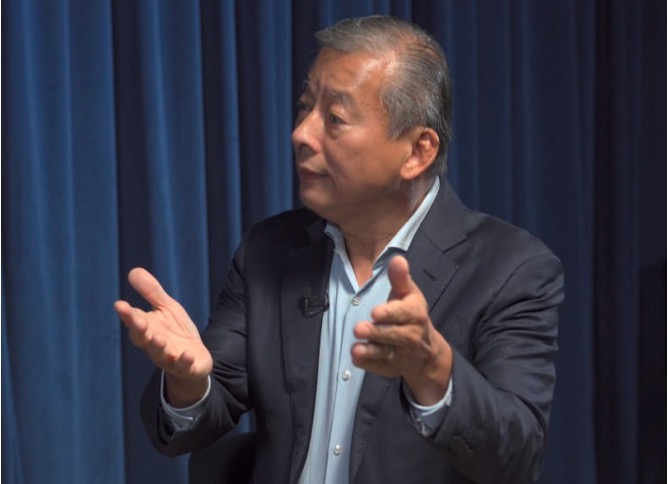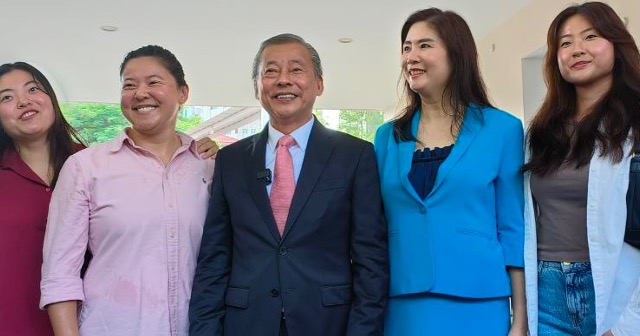George Goh Ching Wah is both exactly whom I expected, and also someone who still managed to surprise me.
I've met a few Singapore millionaires, and Goh seems cut from the same cloth.
Born before Singapore's independence and having achieved success, these men, who helped build our economy in Singapore's early years, made their money when the world was young. They now look out on a new century at once rife with danger and opportunity.
Opportunity is a theme Goh keeps coming back to. He is a self-made man, as he reminds me more than once, and he would like Singaporean youths who come "from nothing", like himself, to achieve success just as he has.
While it is unclear how much the elected President can actually do about this, other than serving as an inspirational example, something about Goh's earnest manner convinces me of his sincerity.
Eligibility
We met at Mothership's office on Jul. 12. The first thing I wanted to know is Goh even qualifies as a presidential candidate.
Political observers have raised the possibility that Goh may not automatically qualify under the private-sector requirement.
Under such requirements, a potential candidate must have served as the chief executive of a company for three years, and that company must have, on average, at least S$500 million in shareholders’ equity. It also must have been profitable after tax throughout those three years.
Using market data, the Straits Times determined that Goh's company Ossia International averaged about S$50 million in shareholders’ equity from 2021 to 2023.
However, analysts speculated that Goh could qualify under what's known as the private sector deliberative track.
Private sector deliberative track
Under Article 19(4)(b) of the Constitution, the Presidential Elections Committee must be satisfied that the candidate has the experience and ability, having regard to the nature of the office, the size and complexity of the private-sector organisation, and the person’s performance in the office, that is comparable to the experience and ability of a company's chief executive with shareholders’ equity of at least S$500 million or more, among other considerations.
Goh believes he qualifies. According to one of his media statements, he has been advised that that the stable of companies which he manages, taken together, would enable him to qualify under Article 19(4)(b).
In another, it states that over the past four decades, Goh has acquired over 100 companies with a collective market capitalisation value of S$3.15 billion.
Goh's media team has said it is up to the PEC to "decide his eligibility". But I wanted to hear it from Goh himself, so I put the question to him. "Mr Goh, what makes you think you can qualify this time?"
 Photo by Mothership
Photo by Mothership
Running multiple companies
Goh pointed out that most people are aware of Article 19(4)(a) of the Constitution, with the S$500 million shareholder equity requirement. Goh explained that you can be the chief executive of a holding company, or parent, that may have four companies under it. If you consolidate everything together, and if the equity meets S$500 million, you qualify.
He also laid out the other necessary criteria. You have to be the "most senior" person in the organisation, at the end of the three-year period you must be profitable, and the minimum equity must be S$500 million.
But the sister act (b), under which Goh is seeking eligibility, is less well-known. "For my case, I definitely have S$500 million, if not I wouldn't even have considered to apply," Goh said.
He emphasised that he is both a shareholder and chief executive in multiple companies, which he runs concurrently. However, Goh needs to oversee multiple companies, while someone heading a "parent company" just has to worry about that one. He also has to make sure each company he runs remains profitable.
"(If) you consolidate and your parent (company) is still profitable, you pass the test. I cannot do that. I have to make sure, profit, profit, profit, profit, no single entity (has a) loss. And the (parent company) of the group still have a chance (even if) one entity (makes a) loss, but I cannot."
Three corner fights
Those familiar with Singapore politics are well aware of three-or-more cornered fights.
Cast your mind back to the last presidential election in 2011, or as it's known in some quarters, the Battle of the Four Tans.
The four candidates threw their hats in the ring. The so-called establishment candidate, former Deputy Prime Minister Tony Tan, beat his closest challenger Tan Cheng Bock by a margin of under 7,400 votes, less than a percentage point. If not for the votes going to the other two Tans, the future Progress Singapore Party leader and former veteran MP might have won.
When I spoke to Goh, a third challenger had not yet announced their attention to run. But the possibility remained. If someone else entered the race and Goh also qualified, could we see a repeat of 2011?
I put it to Goh. "If another so-called non-establishment candidate declares their intention to run, would you sit down with this person and discuss things with them?"
Goh replied that the decision to stand for election "must be from you".
Independence
Goh spoke about his focus on his own campaign, to do his job well, and to make sure he can "carry out the work independently."
"Any other people come forward, they have to do one check. Whether they have political alliances in the past. For me, I don't have," Goh said.
"If they make policy in the past, today they stand for election, they say 'I want to check and balance', whatever you call it, I don't understand how it works," he added, in what may have been a jab towards establishment candidates.
Goh also spoke about transparency in appointing key office holders in the public service.
Goh said as President, he will look at the appointments with "a fresh pair of eyes" and assess them objectively. He said that if he or she is a wrong key appointment holder, he will "openly say that this is wrong".
A new challenger awaits
On July 15, following our interview, it was reported that former GIC chief investment officer Peter Ng Kok Song is contemplating a bid for the presidency.
Speaking to the media during a walkabout on July 16, Goh said a candidate should not have held appointments in a "government-linked corporation or company, or sovereign fund".
While not explicitly mentioning Ng, Goh also said that a candidate's company should not have received investments from a sovereign wealth fund.
Ng is the chairman of Avanda Investment Management, which according to the Straits Times, counted both GIC and Temasek as its founding clients with billions in assets.
What about a split vote?
But I still wanted to know -- what if someone else who also positions as a non-establishment candidate does qualify? Wouldn't that risk splitting the non-establishment vote, assuming Goh qualifies too?
Goh referred to 2011, and pointed out that the non-establishment vote then (in other words, those who did not vote for Tony Tan) made up 65 per cent of the total.
He said this was a clear sign that Singaporeans don't want "anybody linked to (the) establishment", nor someone previously involved in policymaking. Goh said that if elected, he would carry out his duties independently and objectively.
"Do you know what the young people want? It's very simple, fairness. Let's be more fair. If (there's a) candidate from public sector, (a candidate) from private sector, what's wrong with that? Why not give the private sector a chance? Why must (the President) be from the same group of people?"
He added that he believes the electorate will not return a repeat of 2011.
Referring to himself, he said: "This one is the independent one. So vote for me to go in, this is what I suggest."
It appeared that regardless of other potential opponents, Goh still intends to compete.
Religious views
Before we wrap up, I have one final question for Goh. As someone who does not share his strict religious views, I am concerned if they would in any way impact his actions as President, if elected.
"In this Singapore culture, we all must respect...culture, language, race, religion, even gender, make sure we are equal. This is the society we are in," Goh said. "Everyone must learn to respect each other."
The President is for all, Goh said. The President, it's very clear, is for all the people regardless of race, religion or cultural practices.
"Let's respect them" he said. "This is my view."
Top image by Mothership.
If you like what you read, follow us on Facebook, Instagram, Twitter and Telegram to get the latest updates.



